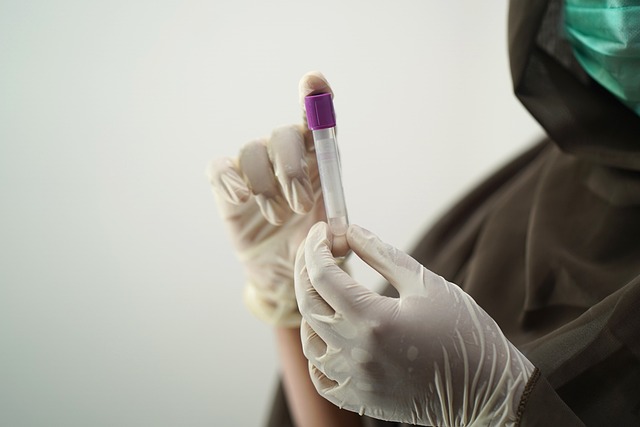Understanding cholesterol's role in reproductive health is crucial, as it serves as a critical biomarker and precursor to essential hormones like estrogen and progesterone. In the UK, a cholesterol blood test is readily available and plays an instrumental part in diagnosing and managing reproductive health issues by providing insights into an individual's hormonal balance. This test not only assesses cardiovascular risk but also offers valuable information on reproductive function and hormone synthesis. Elevated cholesterol can indicate metabolic dysfunctions affecting steroidogenic enzymes, while low levels may signal hormone production issues potentially impacting fertility. Healthcare providers in the UK use cholesterol test results to tailor treatment plans for conditions like Polycystic Ovary Syndrome (PCOS), where cholesterol abnormalities are both a symptom and a consequence. Regular monitoring of cholesterol, alongside other hormonal assessments, is advocated to gain a comprehensive understanding of reproductive health, informing treatment decisions and enhancing the prospects for successful management of fertility issues in the UK. The NHS supports patient access to these tests, emphasizing the importance of collaboration between patients and healthcare professionals for accurate diagnoses and effective treatments. Advanced laboratory techniques and patient-centered care strategies are employed in the UK to provide personalized care for those with reproductive health concerns, aiming to improve long-term health outcomes.
navigaing the complexities of reproductive health often necessitates a deep dive into hormonal dynamics. An emerging focus in this domain is the role of cholesterol, a pivotal element in hormone synthesis, and its implications for fertility. This article elucidates how a Cholesterol Blood Test UK can serve as an instrumental diagnostic tool in decoding hormonal imbalances. By exploring the mechanics of cholesterol’s support in hormone production, we provide insights into personalized treatment approaches for reproductive issues. Through these lenses, readers will gain a comprehensive understanding of the interplay between lipid profiles and reproductive health, paving the way for informed decision-making in fertility management.
- Decoding Hormonal Imbalances: The Role of Cholesterol Blood Tests in Reproductive Health
- Understanding the Mechanics: How Cholesterol Supports Hormone Production and Its Impact on Fertility
- Navigating Diagnosis and Treatment: Personalized Approaches to Addressing Reproductive Issues Through Hormone Analysis
Decoding Hormonal Imbalances: The Role of Cholesterol Blood Tests in Reproductive Health

Understanding hormonal imbalances is pivotal in the realm of reproductive health. One critical aspect of this understanding involves the assessment of cholesterol levels through a cholesterol blood test. This test, widely accessible in the UK, plays a vital role in diagnosing and managing conditions that can affect reproductive function. Cholesterol is not solely a marker for cardiovascular health; it’s also a precursor to various hormones, including those integral to reproductive processes such as estrogen and progesterone. Elevated cholesterol levels can indicate issues with steroidogenic enzymes or other metabolic pathways that are essential for proper hormone production and balance. Conversely, low cholesterol might suggest an underlying issue in hormone synthesis that could impact fertility. By analyzing the results of a cholesterol blood test in the context of reproductive health, healthcare providers can tailor treatments to address these imbalances effectively. This is particularly important for conditions like Polycystic Ovary Syndrome (PCOS), where cholesterol abnormalities can be both a symptom and a consequence of the disorder. Regular monitoring of cholesterol levels, alongside other hormonal assays, provides comprehensive insight into a patient’s reproductive health status, guiding treatment decisions and optimizing outcomes for those seeking to understand or address their reproductive issues.
Understanding the Mechanics: How Cholesterol Supports Hormone Production and Its Impact on Fertility

Cholesterol is a fundamental component in the human body, serving as a precursor for hormone synthesis, particularly within the reproductive system. The ovaries and testes, key players in reproductive health, rely on cholesterol to produce steroid hormones such as estrogen, progesterone, and testosterone. These hormones regulate the menstrual cycle, egg production, sperm production, and sexual characteristics, all of which are crucial for conception and fertility. Adequate levels of cholesterol are necessary to ensure the ovaries and testes can efficiently produce these vital hormones. In the UK, a simple blood test known as a cholesterol panel can provide insights into an individual’s overall cholesterol levels, including HDL (high-density lipoprotein) and LDL (low-density lipoprotein). This test is not exclusively about cardiovascular health; it also offers a glimpse into the reproductive hormone production dynamics. For those experiencing reproductive issues, understanding cholesterol levels can be instrumental in identifying potential contributing factors. It’s advisable for individuals facing fertility challenges to consult with healthcare professionals who can interpret these results within the context of their overall health and reproductive function. This way, any imbalances or deficiencies in cholesterol that may affect hormone production can be addressed promptly, potentially improving fertility outcomes and supporting reproductive health more holistically.
Navigating Diagnosis and Treatment: Personalized Approaches to Addressing Reproductive Issues Through Hormone Analysis

Understanding and addressing reproductive issues often hinge on precise hormone analysis, which can reveal imbalances or deficiencies that underlie fertility challenges. In the UK, a key diagnostic tool is the cholesterol blood test, which measures the levels of sex hormones, including testosterone and estrogen, as well as other hormones crucial for reproductive health. This test is pivotal in identifying disorders such as Polycystic Ovary Syndrome (PCOS) or thyroid dysfunction that can impact ovulation and fertility. The results inform personalized treatment plans, which may range from lifestyle modifications to hormone replacement therapy or assisted reproductive technologies. Healthcare providers tailor these interventions to the individual’s unique hormonal profile, enhancing the chances of conception and improving overall reproductive health outcomes.
The journey through diagnosis and treatment for reproductive issues is one that requires a collaborative approach between patients and medical professionals. In the UK, the National Health Service (NHS) provides access to cholesterol blood tests as part of the diagnostic process for reproductive health concerns. Patients are encouraged to engage actively in their healthcare by discussing their symptoms and medical history with their doctors to ensure the most accurate hormone analysis. With advanced laboratory techniques and a focus on patient-centered care, the UK’s healthcare system is equipped to offer comprehensive support to individuals navigating the complexities of reproductive health issues. Personalized treatment strategies, informed by precise hormone measurements, are instrumental in addressing the diverse and individual nature of these challenges.
In conclusion, hormonal imbalances often underpin reproductive issues, and understanding their roots through advanced diagnostic tools such as cholesterol blood tests can pave the way for personalized treatment plans. The article has delved into how cholesterol, a critical component in hormone synthesis, plays a pivotal role in fertility and overall reproductive health. By navigating the complexities of diagnosis and treatment with these insights, healthcare professionals can offer more effective solutions to those facing reproductive challenges. For individuals in the UK seeking clarity on their reproductive health, a cholesterol blood test can be an instrumental step towards addressing hormonal discrepancies and improving fertility outcomes. It is through such tailored approaches that we can enhance the support system for those dealing with these issues, ensuring a more nuanced and effective healthcare experience within the UK’s medical landscape.
